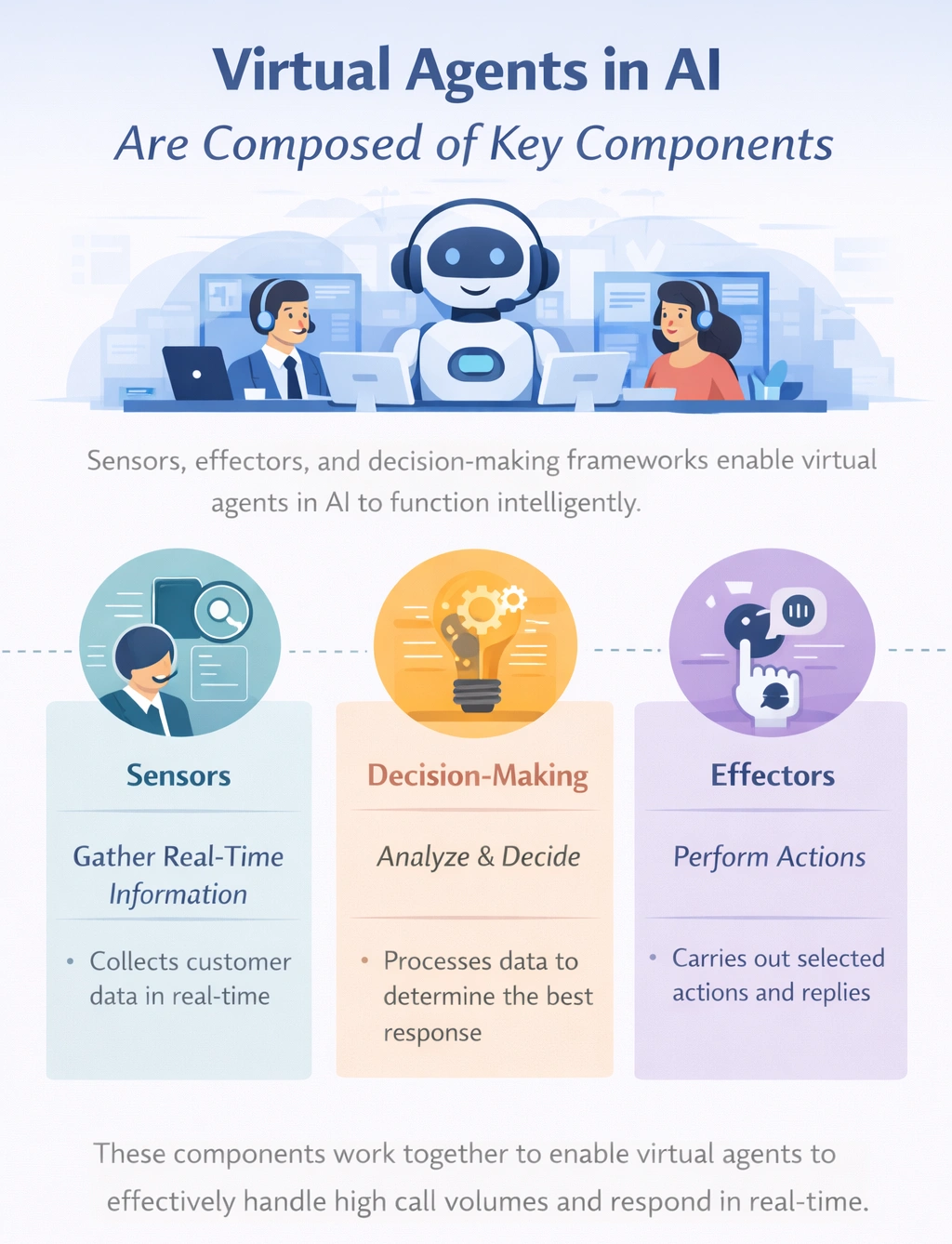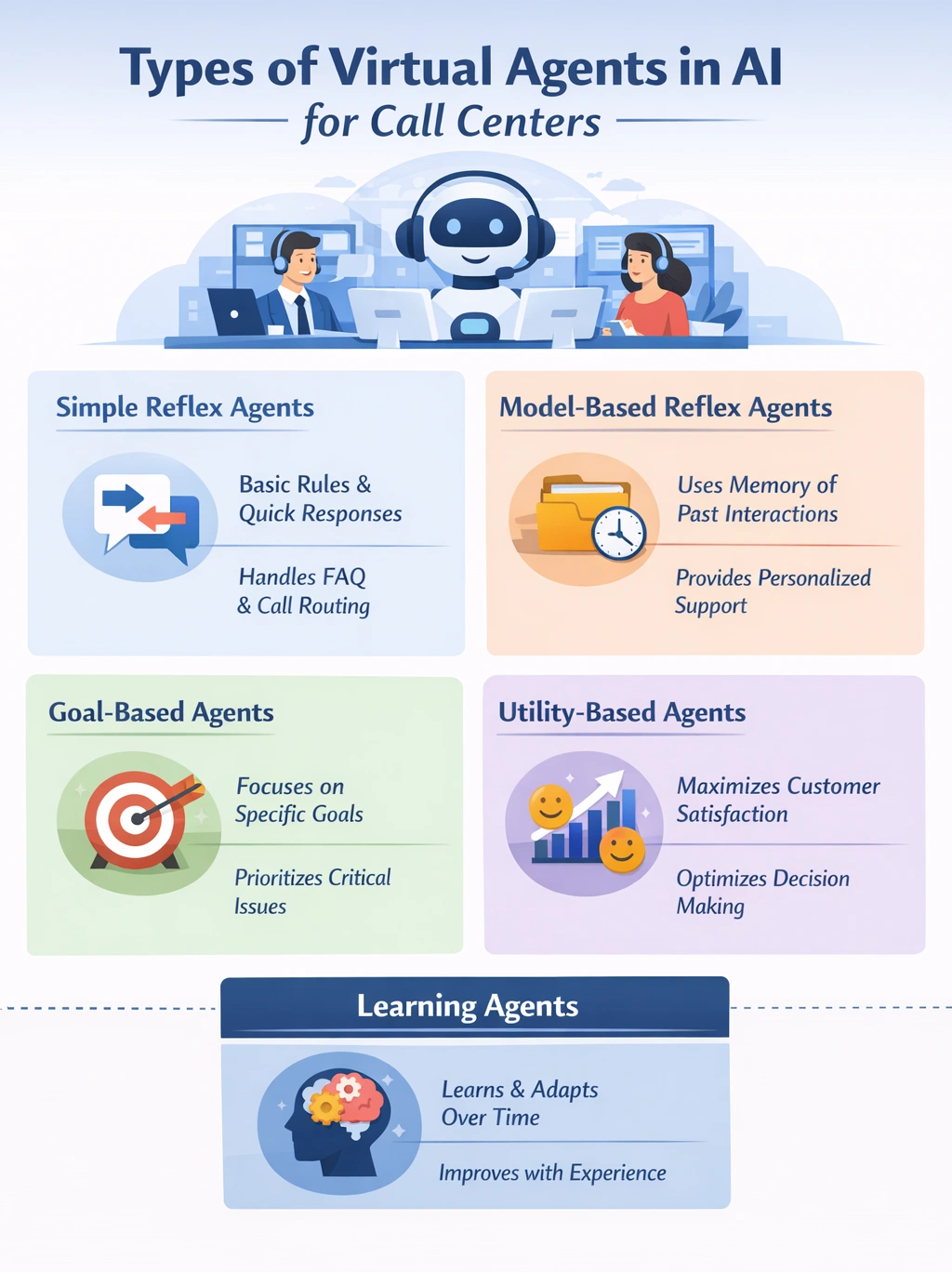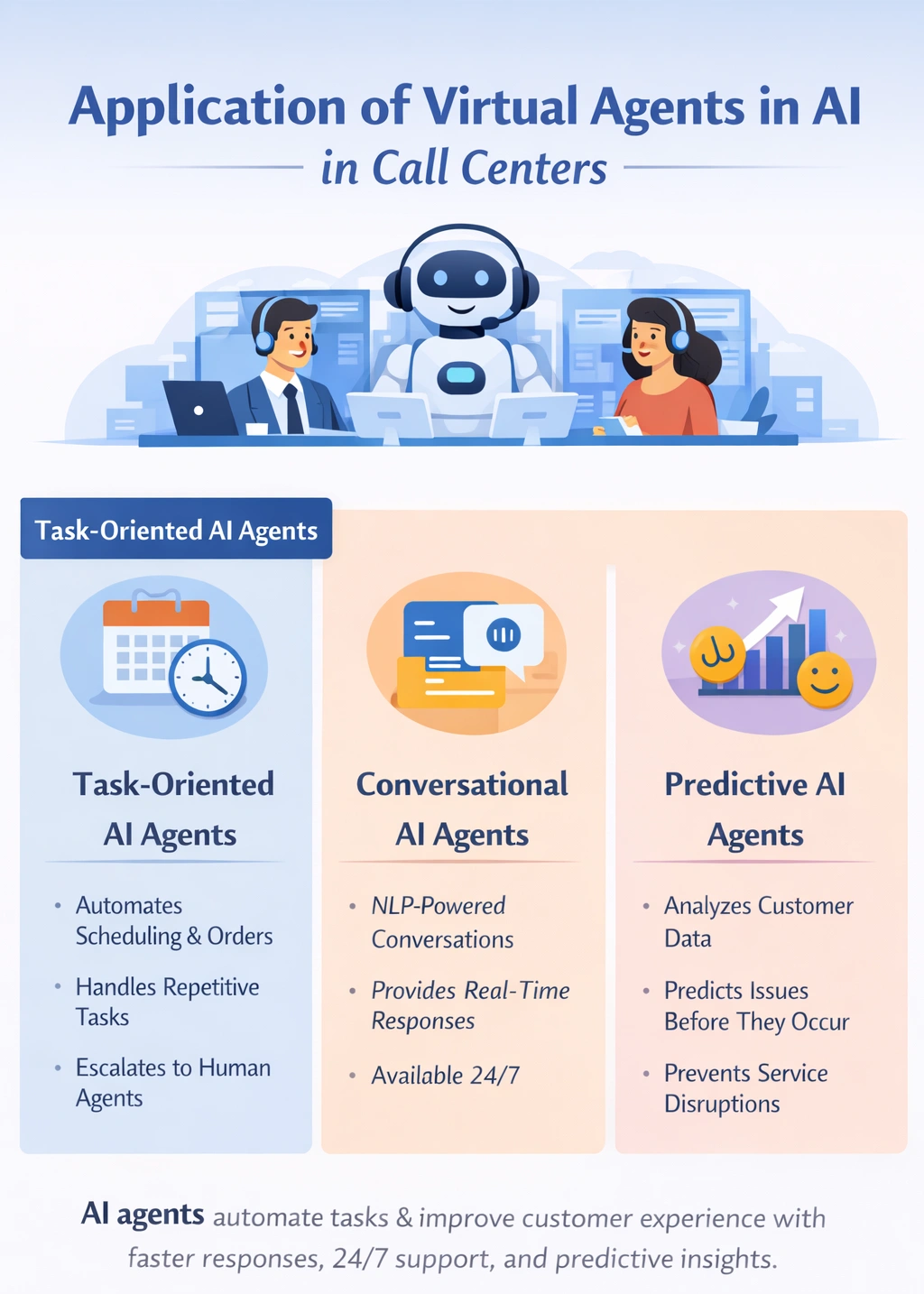Virtual agents in AI streamline call center operations through task automation, real-time conversations, and predictive support. From simple reflex to learning agents, each type plays a distinct role in improving efficiency and personalization. Convin’s AI Phone Calls further enhances this impact. Explore how your call center can evolve by leveraging the right virtual agents in AI.
Explore types of virtual agents in AI now.
What Are the Different Types of Virtual Agents in AI?
Artificial intelligence (AI) revolutionizes how businesses manage interactions, automate decisions, and improve efficiency. In particular, intelligent AI agents work autonomously to complete tasks, enhance decision-making, and provide essential solutions across industries.
Understanding the various types of AI agents can enhance a call center's performance, reduce operational costs, and improve customer satisfaction.
Virtual Agents in AI Are Composed of Key Components
In AI systems, AI agents comprise sensors, effectors, and decision-making frameworks that allow them to function intelligently.

Each component helps these different types of AI agents collect, process, and respond to data in real-time environments, making them crucial for handling high call volumes in customer service.
- Sensors gather real-time information across customer interactions.
- Effectors carry out the chosen responses and actions based on customer needs.
- Decision-making structures analyze data and guide agents to the most effective responses.
Convin’s conversational AI agents use these components in call centers to respond quickly and accurately, handling inquiries while improving efficiency. Such agents help reduce response times and are particularly valuable for industries that prioritize customer satisfaction.
Types of Intelligent Agents in AI for Call Centers
Different types of intelligent agents in AI play distinct roles based on their capabilities and autonomy. Understanding the types of AI agents can help call centers assign tasks based on their complexity and optimize performance.

1. Simple Reflex Agents
Simple reflex agents respond directly to the environment, using programmed rules to manage routine tasks. They need to retain information to work efficiently for high-frequency, simple tasks.
- React to basic tasks, such as call routing or FAQs, without retaining past data.
- Operate based on if-then rules, ideal for predictable tasks with low complexity.
This functionality benefits Convin’s AI Phone Calls by managing routine customer inquiries and improving call center resource allocation.
2. Model-Based Reflex Agents
Model-based reflex agents are more adaptable. They use memory to store and recall past actions, enabling them to make informed decisions in changing conditions. For customer service, these typical intelligent agents in AI help provide personalized interactions by accessing customer history.
- Maintain an internal model of past interactions to inform responses.
- Handle complex customer inquiries by drawing on past data for accuracy.
With Convin’s conversational AI agents, call centers can utilize model-based reflex agents to tailor responses to each customer’s unique profile, thereby enhancing personalized service.
3. Goal-Based Agents
Goal-based agents work with defined objectives, guiding them to prioritize specific customer issues or goals. They analyze actions to select those that help them achieve key outcomes.
- Choose actions that align with service goals, such as prioritizing urgent complaints.
- These agents are effective in managing escalations, focusing on actions with the highest impact.
Using Convin’s conversational AI, call centers can deploy goal-based agents to prioritize VIP clients or time-sensitive issues, ensuring prompt service where it’s most needed.
4. Utility-Based Agents
Utility-based agents take goal-based actions further by calculating the value of each possible outcome, making them ideal for complex, decision-driven scenarios. These types of ai agents optimize responses based on metrics like customer satisfaction or conversion rates.
- Evaluate outcomes to maximize utility, like customer satisfaction or lead conversion potential.
- Select actions with the highest utility, helping call centers align responses with business goals.
Convin’s AI Phone Calls leverages this utility-focused approach, especially when optimizing interactions to achieve higher satisfaction scores or improve conversion rates.
5. Learning Agents
Learning agents are advanced AI agents that continuously improve by adapting to new information. They refine their responses, learning from customer interactions to make better decisions.
- Enhance efficiency by leveraging historical data and customer feedback.
- Adapt responses based on evolving patterns to enhance long-term service quality.
Convin’s AI Phone Calls incorporate learning capabilities, making them well-suited for ongoing improvement in customer service. Over time, this enables call centers to provide higher-quality, more efficient service.
Identify the best AI agent for your needs.
Application of Virtual Agents in AI in Call Centers
AI agents play a pivotal role in transforming call center operations. They automate tasks once handled manually, significantly improving both speed and accuracy.

Below are the primary ways agents of AI enhance call center efficiency:
- Task-Oriented AI Agents: Task-oriented AI agents excel at automating specific, repetitive tasks. These agents can schedule appointments, provide order statuses, or escalate tickets to human agents for further assistance. By managing routine operations, human agents can focus on more complex customer issues that require personalized attention.
- Conversational AI Agents: These agents, powered by Natural Language Processing (NLP), enable natural and fluid customer conversations. These agents understand customer queries and provide real-time responses. In a call center setting, conversational AI agents enhance response times and provide 24/7 support, which is crucial for improving the customer experience.
- Predictive AI Agents: AI predictive agents analyze historical data to anticipate customer needs before they arise. They can detect patterns that indicate potential issues, such as service outages or account discrepancies, allowing call centers to address these problems proactively. This improves customer satisfaction and reduces the volume of incoming support requests.
AI agents automate operational tasks and enhance the customer experience by reducing wait times, efficiently handling inquiries, and providing personalized interactions based on customers' historical data.
Improve customer support with AI-powered calls.
This blog is just the start.
Unlock the power of Convin’s AI with a live demo.

Typical Virtual Agents in AI Used in Industries
Intelligent agents aren’t confined to call centers; their utility spans various industries, where automation and decision-making processes are essential for maintaining a competitive advantage.
- Healthcare: AI agents assist in appointment scheduling, patient data management, and diagnostic tools, enabling medical professionals to make faster and more accurate decisions. This reduces administrative workloads and improves patient outcomes.
- Finance: AI agents are widely used in loan processing, fraud detection, and financial advising. By automating risk assessments and customer interactions, financial institutions can enhance operational efficiency and minimize errors, resulting in faster services and increased customer satisfaction.
- Retail and E-commerce: In retail, AI agents manage product recommendations, automate customer service, and manage inventory. This helps retailers personalize customer experiences while streamlining backend operations, such as order processing and logistics.
In each of these sectors, AI agents are driving transformation by optimizing workflows, enhancing decision-making processes, and reducing the need for manual intervention.
Discover utility-based agents for smarter service.
Convin’s AI Phone Calls: Revolutionizing Virtual Agents in AI Phone Calls
Convin’s AI Phone Calls is a game-changer for call center managers seeking to enhance operational efficiency and lower costs. Designed to handle inbound and outbound calls, Convin’s AI Phone Calls automate repetitive tasks and enable agents to focus on high-value interactions. Here's how Convin’s AI phone calls are transforming call centers:
- 100% Automation for Inbound/Outbound Calls: Convin ensures no call goes unanswered by fully automating call handling. It reduces the need for human intervention, making the call process seamless and efficient.
- 90% Lower Manpower Requirements: With Convin Virtual Agent managing most customer interactions, call centers can operate with fewer staff, reducing overhead costs while maintaining service quality.
- 10x Increase in Conversions: Convin’s AI Phone Calls intelligently qualify leads, enabling sales teams to focus only on high-potential prospects. This has led to a significant increase in conversion rates, as valuable leads are followed up with at the right time.
- 50% Reduction in Errors: Automated interactions with Convin reduce human errors, including miscommunication and incorrect data entry. This enhances overall service quality and ensures accurate record-keeping, essential in customer service environments.
Convin’s AI phone calls offer a robust solution for call centers seeking to streamline operations, enhance service consistency, and lower operational costs. For managers and leaders under pressure to deliver more with less, Convin provides measurable improvements in cost efficiency, quality, and sales outcomes.
Schedule your Convin demo now!
Harnessing Virtual Agents in AI for a Future-Ready Call Center
The different types of virtual agents in AI offer innovative solutions for businesses across industries, particularly call centers. From simple reflex agents that manage basic tasks to advanced learning agents that continuously improve, AI agents enable call centers to handle large customer interactions more efficiently and accurately.
Convin’s AI Phone Calls further this by automating entire call processes, reducing errors, and increasing lead conversions. Call centers that leverage AI agents improve operational efficiency and deliver a superior customer experience. Investing in AI-driven solutions is essential for staying competitive and meeting the evolving needs of modern customers.
Frequently Asked Questions
1. Who are the Big 4 AI agents?
Simple reflex agents, model-based reflex agents, goal-based agents, and utility-based agents.
2. What are Level 4 agents of AI?
Near-autonomous: the agent acts on its own and only seeks human approval in risky or pre-specified cases (“user as approver”).
3. What are the 7 types of AI agents?
Reactive machines, limited memory, theory of mind, self-aware AI, narrow AI, general AI, and superintelligent AI.
4. What is an agent in AI?
An agent in AI is an entity that perceives its environment through sensors and acts upon it using actuators to achieve goals.








.avif)